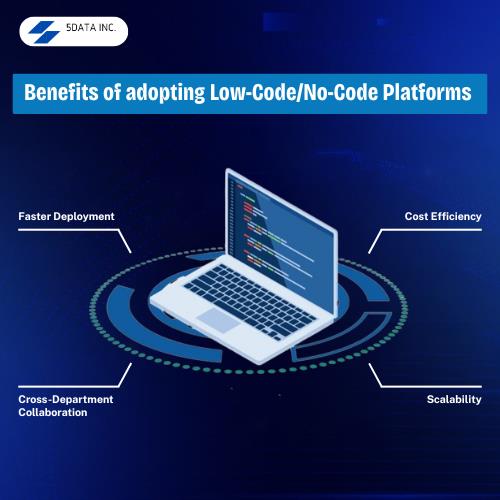For a long time, data science was a specialized field reserved for expert coders, data engineers, and statisticians. Extracting meaningful insights demanded proficiency in programming languages like Python, R, or SQL, along with deep knowledge of machine learning algorithms. However, this landscape is rapidly changing.
With the emergence of easier-to-use tools like low-code and no-code platforms, data is no longer confined to tech experts; it’s becoming accessible to everyone. This shift isn’t just technological; it’s changing how businesses think about data. The transformation democratizes access and sparks innovation across every level of an organization.
Explore the blog to see how low-code and no-code platforms are removing technical barriers, empowering non-developers to work with data, and driving faster, smarter decisions across teams. Whether you’re in marketing, operations, or leadership, you’ll discover how these tools are reshaping the way businesses use data, making it a shared resource, not a specialized skill.
What we cover in this blog
Key Takeaways
- Over 70% of new business applications will be built using low-code/no-code tools by 2025, empowering non-tech users like never before. (Source: Gartner)
- Citizen Data Scientists are reshaping analytics by blending domain knowledge with intuitive tools, leading to faster, smarter decisions.
- Low-code and no-code platforms reduce development time by up to 90%, driving cost efficiency, agility, and cross-functional innovation.
The Traditional Data Barrier
Organizations today generate massive amounts of data, yet much of it remains unused. The primary reason? Traditional data analysis requires technical skills that many business users lack. This creates bottlenecks where insights get trapped in silos or delayed by lengthy development cycles.
Decision-makers such as marketers, product managers, or HR leaders often must wait for IT or data teams to fulfill their data requests, slowing down timely decision-making. Simply put, data insights were historically limited to those who could code.
The Low-Code/No-Code Revolution in Data Science
Low-code platforms require minimal coding to build applications or workflows, while no-code platforms remove coding entirely by offering intuitive drag-and-drop interfaces.
In data science, these platforms simplify tasks like:
- Integrating and cleaning data
- Creating dashboards and reports
- Running predictive analytics
- Automating data pipelines
Popular tools like Power BI, Tableau, Alteryx, Google AutoML, and KNIME empower users to visualize and analyze data without writing a single line of code. This shift has given rise to a new breed of professionals: the Citizen Data Scientist.

The Rise of the Citizen Data Scientist
Gartner coined the term Citizen Data Scientist to describe non-technical professionals who use user-friendly tools to analyze data and build models. These individuals have strong domain knowledge, whether in sales, marketing, or operations, but lack traditional coding expertise.
Imagine a sales manager using a no-code platform to import customer data, segment leads, and predict churn – all independently, without relying on the data team. This is no longer a futuristic scenario; it’s today’s reality.
By empowering those closest to business challenges, data democratization enables faster, more informed decision-making.
Why Businesses Are Embracing Low-Code/No-Code Platforms
The benefits of adopting these platforms extend beyond ease of use:
- Faster Deployment: Projects that once took weeks can now be completed in days.
- Cost Efficiency: Reduces dependence on specialized developers for every data request.
- Cross-Department Collaboration: Business users and IT teams can co-create solutions.
- Scalability: Easily adapts as business needs evolve and data complexity grows.
Real-World Impact Across Industries
- Retail: Store managers monitor inventory in real-time using self-service dashboards to optimize stock levels.
- Healthcare: Administrators analyze patient data to improve staffing and resource allocation.
- Finance: Advisors generate customized portfolio reports with drag-and-drop analytics.
Redefining the Role of Data Scientists
Contrary to fears that no-code tools will replace data scientists, their role is evolving:
- Auditing and refining models created by citizen data scientists
- Training teams on data literacy
- Tackling complex analytical challenges
- Ensuring ethical and compliant AI usage
These platforms free data scientists from repetitive tasks, helping them to focus on strategy, innovation, and governance.
Challenges to Consider
While democratizing data offers many benefits, it also comes with challenges:
- Data Governance: More users handling data means stricter policies to maintain accuracy and consistency.
- Training & Literacy: Organizations must invest in upskilling users to avoid misinterpretation.
- Tool Fragmentation: Excessive tools across teams can create silos—standardization is key.
A hybrid approach, where citizen users collaborate with technical experts, balances speed with quality.
The Future: AI, No-Code, and Cloud
With AI integrated into no-code platforms, we are entering an era where:
- Insights are automatically generated and visualized
- Workflows are smarter and faster
- Teams collaborate in real-time across the globe
Coupled with cloud infrastructure, this enables scalability, accessibility, and real-time intelligence at scale.
Conclusion
The democratization of data is more than a technological upgrade; it’s a cultural shift. By putting powerful tools in the hands of more people, organizations become more agile, innovative, and responsive. Low-code and no-code platforms don’t replace data experts; they empower entire organizations to think and act with data.
Data is no longer a privilege; it’s a shared asset. Companies embracing this reality will lead the future.
Frequently Asked Questions
1. What role do low-code and no-code tools play in data science today?
These tools enable individuals without extensive coding skills to interact with data, perform analyses, and generate actionable insights, reducing dependency on specialized programming knowledge.
2. Who are citizen data scientists, and why do they matter?
Citizen data scientists are professionals who, despite lacking formal data science education, utilize user-friendly platforms to address challenges and make informed decisions through data in their respective roles.
3. Do no-code platforms replace traditional data scientists?
No, these platforms complement data scientists by automating routine and repetitive tasks, freeing experts to focus on strategic planning, model evaluation, and tackling complex analytical problems.
